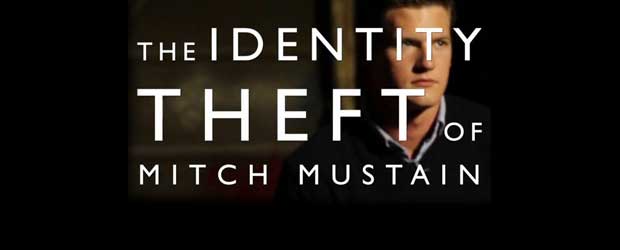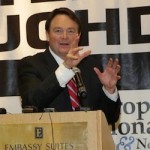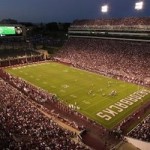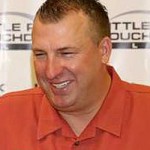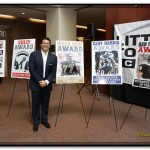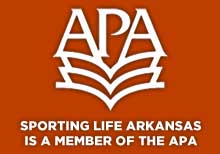 There’s player-speak and coach-speak, of which we hear a lot these days whether its covering college football or attending the weekly Little Rock Touchdown Club meetings. But then there is the refreshing frankness of Mitch Mustain, one of the most direct and candid speakers to stop by the club since its formation several years back. For all that honest, he’s dry and admittedly a “terrible” speaker just standing up at a dais and delivering his thoughts on his time at Arkansas, at Southern Cal after his brief Razorback career and now as the focal point of a documentary subject.
There’s player-speak and coach-speak, of which we hear a lot these days whether its covering college football or attending the weekly Little Rock Touchdown Club meetings. But then there is the refreshing frankness of Mitch Mustain, one of the most direct and candid speakers to stop by the club since its formation several years back. For all that honest, he’s dry and admittedly a “terrible” speaker just standing up at a dais and delivering his thoughts on his time at Arkansas, at Southern Cal after his brief Razorback career and now as the focal point of a documentary subject.
But put him in a question-and-answer session, and he thrives.
The Little Rock Touchdown Club membership heard 30 minutes of what went on at Arkansas in that controversial 2006 season, in which Mustain started and won seven straight games, then started an eighth before being benched for the rest of the regular season. Houston Nutt’s team went 10-4, losing their last three games. Mustain departed the program in January, and on Monday at the Touchdown Club he basically explained that he and the other “Springdale 5” and Coach Gus Malzahn were sold a bill of goods.
This is all covered in the new documentary “The Indentity Theft of Mitch Mustain,” which will be one of the featured sports documentaries in the sports-heavy edition of the Hot Springs Documentary Film Festival this week.
“I didn’t give it that title, I don’t like the title, really,” Mustain told the crowd.
The Mustain film will first be shown at 8 p.m. Friday. “The Big Shootout” about the Texas-Arkansas game of 1969 will begin at 5:40 p.m. Another show time for the Mustain movie is scheduled for Sunday. Mustain will attend the Hot Springs premiere on Friday night and, if his flight schedule works out, he’ll still be around for Sunday’s showing. This trip back for the Touchdown Club meeting and the Film Festival is his first time in Arkansas in 10 months, he said.
He covered a ton of ground with Club president David Bazzel in the Q&A. He spends the off-season now from the Arena Football League — he plays for the San Jose Sabercats — instructing volunteer firemen in Mesa, Ariz. He has high regard for Pete Carroll, the Seattle Seahawks coach who was his USC coach for three years. His one year under Lane Kiffin told him Kiffin lacked the detail-oriented skills of Carroll and that he wouldn’t make it as a head coach, which proved true when Kiffin was fired earlier this season.
But, as it turns out, 30 minutes with Mitch Mustain was hardly enough. The media then got 10 more minutes, until it ran out of questions, where he was just as frank. Here are some of the highlights of the post-luncheon media visit:
Question: You’ve probably been asked this in other settings, but you transfer to Southern Cal and sit out in 2007 and Bobby Petrino comes in ’08. Did you ever regret that you didn’t stay at Arkansas and play for him?
Mustain: Nope. People ask that but what they forget is that Petrino recruited me at Louisville. I didn’t care much for him then and still don’t really. I think he did a good job, he’s a good coach and ran a good program, but he seemed to display a lot of the same attitude here at Arkansas and what eventually would have gotten him sent on his way that he displayed at Louisville. I think he did a good job, it worked out well for Ryan Mallett and for Tyler Wilson, they’ve done a great job with it. It just wasn’t for me and I enjoyed my time at Southern California.
Q: Are you following the Razorbacks now from where you live, in Gilbert Ariz.
Mustain: Not following them. Obviously I have friends and family here so I hear about it.
Q: What do you think about the current situation?
Mustain: Yeah, I just, I don’t know … I think they had … well… I’m not going to talk about that. I hope it gets better for them, I really do. I grew up a Razorback fan and obviously in my heart I still am. I want to see them do well. But, I think they’re going to have to start making a little better decisions and I think the problem has always been at the top of it. When that changes, I think it will get on its way.
Q: Did you feel a need to get your own word out by appearing here?
Mustain: Yeah, more than anything. I think David wanted me to mention the documentary more than anything, and I am certainly happy to. Matt Wolfe did such a great job on it. I wanted to speak and be candid and these are good people here that support this club and support Razorback football and college football in general.
Q: You played one year of minor league baseball for the White Sox, would you ever go back to that life again?
Mustain: No. At my age, it was tough anyway, I was a 24-year-old rookie free agent. It’s a tough sport. I gained a whole new respect for it. A lot of my friends in college played baseball and we’d always razz ’em, how easy it was, how they didn’t have to work out, didn’t have to run a lot. I kind of got a taste of my own medicine the year I played. I have a lot of respect for those guys and the schedule they keep and the wear and tear on their bodies. You’re running every day, you’re throwing every day. I just reached a point, I had to be honest with myself. I was glad I went. Obviously I had been curious if I could still play it. I stopped playing because of injury [elbow pain], not because I chose to. I’m glad I went, but it’s a schedule I don’t want to keep, and it’s too much wear and tear and I really had to make a decision to pressing on and risk a career ending injury or get back into football, which is what I love and what I want to do.
Q: How was playing in the White Sox organization. How did that come about?
Mustain: A friend of mind, I was working out with him during the off-season a couple of years ago, and he had played in the White Sox organization for several years, quite a while ago. He knows area scouts and still works with guys in Northwest Arkansas. He asked me if I thought about playing baseball, I hadn’t played since I was 16. He told me he could get me a tryout, and I said ‘whatever.’ He called one Friday and said when could I be ready. I went down to the UA, threw in the bullpen and probably threw the best I’d thrown in my life to that point. That was that.
Q: Do you still talk with Houston Nutt and Gus Malzahn?
Mustain: Not Houston. That went away when 2007, I walked out, and that was the last time. Gus, I talk to pretty regular.
Q: All said and done, do you regret going to Arkansas at all? Do you wish you had gone somewhere else?
Mustain: Certainly, to some degree. I mentioned [earlier, during the luncheon] the Naval Academy in jest here, but honestly that’s a passion of mine. Certainly an opportunity I had then and part of me wonders sometimes … but at the end of the day you can’t second-guess yourself. I made a decision based on what was best for me at that time, what I wanted to do at that time. It didn’t work out. That’s just the way it goes. I’ve had good opportunities since then that have come from that and I can’t complain too much about it.
Q: Do you see yourself getting into coaching?
Mustain: I’ve had the opportunity presented to me, and certainly it’s a good one. If you’re going to work for someone, [Gus] be the guy. It’s not a passion of mine right. I would enjoy coaching but I just got out of college football and the honest truth is, I have interests beyond coaching right now and I want to exhaust those and see if that’s what I want to do before I get into it. There’s plenty of time.
Q: What is Gus Malzahn like? I hear different things from different players who have played for him, about how they take him, because he’s all about football ….
Mustain: Absolutely. Gus is really kinda what you see is what you get. He’s that guy on TV, he’s that guy in person. That’s what he thinks about. You can’t really have a conversation outside of it for a few minutes, a few questions here or there, before he’s talking about [football]. He’s very intense, he’s very passionated, he’s very good at what he does.”
Q: Can he sustain the success he’s had in the past at Auburn?
Mustain: Yes, absolutely.
Q: Do you still harbor any NFL ambitions at all, now that you’re playing in the Arena League?
Mustain: Certainly, certainly. That is what I am shooting for. As great as the Arena League is, it’s not a gig that is going to support anything. I’m playing with the hopes of getting a call and get to move up.
Q: Do you still work with any of the ‘quarterback guru’ guys in California?
Mustain: You know, I haven’t in a while. Once I came out of baseball and right in obviously to working in the off-season, I went straight to San Jose. I’ve got a few tentative plans right now, we’ll see how it works out.
Q: What is the transition like from Arena Football to the regular game, the indoors feel?
Mustain: It’s very different. I had never seen one until we played our first game. And so, you have the same speed, the guys are just as fast, but in just about a quarter of the area of a real field. So, it moves very quick. You learn you can’t do a lot of things you can do on a big field, but you can do some things a little different. It’s just a matter of learning and I was fortunate to have really good teammates, some older guys who have played in the league a long time who are good at it, sat down with me, walked me through it, and got me up to speed.
Q: Was it easy to adjust to the passing-oriented Arena game?
Mustain: One of the benefits is my arm came back as strong as it’s ever been in a long time. I had some nagging injuries from college that weren’t addressed. That’s one thing pro baseball does, they do shoulders very well, they do elbows very well. I came back stronger than ever and had a good time with it.


